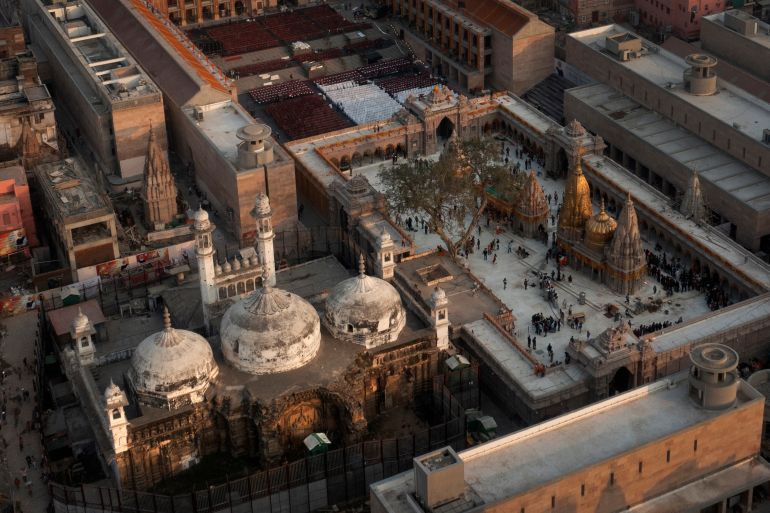India court allows survey of historic mosque to see if it stands on temple
Right-wing Hindu groups allege Gyanvapi Mosque in the northern Varanasi city was built on top of a Hindu temple during the Mughal rule.

An Indian court has ruled that officials can conduct a scientific survey to determine if a 17th-century mosque in the country’s north was built over a Hindu temple.
The Gyanvapi Mosque in Varanasi, a district Prime Minister Narendra Modi represents in parliament, is one of several mosques in Uttar Pradesh state that right-wing Hindu groups claim was built on top of Hindu temples allegedly demolished during the peak of Mughal rule from the 16th to the 18th century.
Keep reading
list of 4 items‘Textbook repeat’: India courts hear Hindu-relics-in-mosque pleas
After Ayodhya, another mosque-temple dispute brews in India’s UP
India’s textbook purge: Why is Modi so scared of history?
The dispute over the mosque – adjacent to the Kashi Vishwanath Temple, a prominent place of worship for India’s 80 percent majority Hindu community – has intensified in recent years. Muslims make up nearly 14 percent of the country’s 1.4 billion people.
Vishnu Shankar Jain, a lawyer representing the Hindu petitioners, said the Allahabad High Court in Uttar Pradesh on Thursday allowed the state-run Archaeological Survey of India to survey the structure without causing any damage to it.
“Scientific survey is necessary in the interest of justice,” Live Law, an online portal for Indian legal news, cited Chief Justice Pritinker Diwaker as saying.
The Muslim petitioners objected to the survey, saying it would damage the structure.
Khalid Rasheed, a Muslim petitioner, said the mosque committee has the option to appeal Thursday’s decision in India’s Supreme Court.
“We are hopeful that justice will be done as the mosque is 600 years old and Muslims have been praying there for long,” Rasheed told reporters.

The Archeological Survey of India began the survey last month, but the project was halted by the Supreme Court to give time for an appeal.
Earlier, five Hindu women sought permission from a court to perform Hindu rituals in one part of the mosque, saying a Hindu temple once stood on the site.
A controversy arose over a structure claimed by the Hindu petitioners as a shivling, a symbol of the Hindu god Shiva. Muslims said it was part of a fountain in the wuzukhana, a small water reservoir used by Muslim devotees to perform ritual ablutions before offering prayers.
The Muslim body, the Anjuman Intezamia Masjid Committee, which manages the Gyanvapi Mosque, contends that the survey is contrary to provisions of a 1991 Indian law protecting places of worship.
The law states that the nature of all places of worship, except Ram Janmabhoomi–Babri Mosque in Ayodhya, shall be maintained as they were on August 15, 1947, and that it is illegal to convert such sites.
A 16th-century Babri Masjid mosque in Ayodhya, a temple town in Uttar Pradesh, was demolished in 1992 by Hindu hardliners who claimed it stood on the exact spot where Lord Ram was born.
The demolition sparked massive religious riots across India that led to the death of some 2,000 people.
In 2019, India’s Supreme Court ruled in favour of a Hindu temple on the disputed religious ground and ordered that alternative land be given to Muslims to build a mosque.
Hindu nationalists had been demanding a temple on the site in Ayodhya since the 1940s. A Hindu trust, under the patronage of Modi’s right-wing government, is building a temple there now.
In 2020, Modi himself laid the foundation stone of the temple, which is likely to be inaugurated ahead of national elections due by May next year.